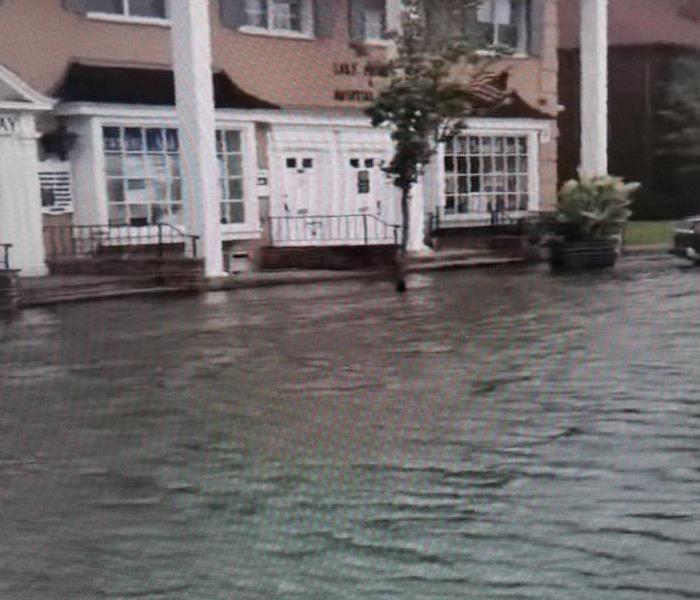Recent Storm Damage Posts
We Mitigate, Cleanup, & Restore Flood Damaged Homes in Denville
10/5/2024 (Permalink)
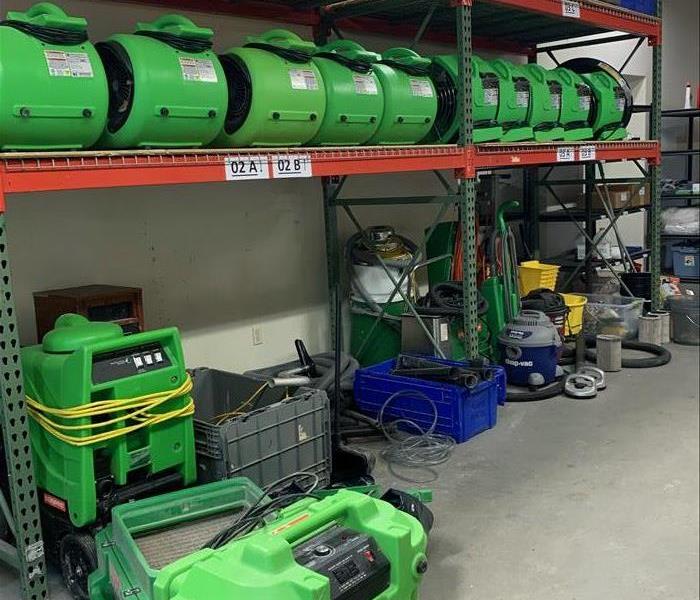 Our SERVPRO team extracts floodwaters and rescues your Denville home using advanced equipment. Here to Help®
Our SERVPRO team extracts floodwaters and rescues your Denville home using advanced equipment. Here to Help®
Storms, Flooding, & High Winds Can Ruin Your House
Because weather is unpredictable, special insurance is purchased for flood damage and other situations caused by storms and high winds. SERVPRO® is always nearby to assist homeowners in Denville with flood damage mitigation, cleanup, and restoration.
We answer calls from property owners 24 hours a day, 365 days a year in Denville. When flood damage occurs, a fast response helps minimize any destruction sustained. Our services include stopping damage from worsening (mitigation), cleanup, and restoration/rebuilding. Each portion of the work is crucial to making your home "Like it never even happened."
Here are some ways that homes with storm and flood damage can worsen when they don't receive prompt responses from the property owner:
- Storms,
- Flooding, and
- High winds.
When rain enters your residence through an open window or a spot on your roof with missing shingles, your home's interior can develop secondary water damage. Mold and mildew damage can affect almost any area in your home. Rain that comes in through the roof can ruin your insulation. We extract water, eliminate remaining moisture, and sanitize affected areas quickly to prevent additional damage. Our remediation team also controls microbial infestations, so there is no need for a second company.
Flooding receives a similar response from SERVPRO but on a larger scale. You can trust us to do the work in a rapid but cost-effectively, giving you the desired results.
Windy weather can leave a roof with torn shingles and exposed paper. Objects picked up by strong, gusty winds can find their way against your home, damaging siding elements. Other times, high winds merely dump unwanted debris into your property. We handle these and other situations for our customers.
When your home experiences problems after a storm or sustains flood damage, call (973) 983-5657 to talk to SERVPRO of North Morris County for a fast, dedicated team with the experience needed to protect your investment.
Denville Homeowners Trust SERVPRO after Flood Damage
12/17/2023 (Permalink)
 After suffering flood damage in your home, the water needs to be removed quickly. Call SERVPRO 24/7 for professional water removal services.
After suffering flood damage in your home, the water needs to be removed quickly. Call SERVPRO 24/7 for professional water removal services.
SERVPRO Offers Reliable Flood Damage Restoration in Denville
Flood damage to your Denville home can leave a lasting impact on the structure. A delay in restoration can spell disaster, and the moisture continues to damage crucial aspects of the building. SERVPRO® techs understand the importance of quick action during this critical period after water damage and use industry-leading equipment and methods to limit the damage.
SERVPRO techs use some of the most efficient pumps and extractors to remove water during flood damage restoration of your Denville home. We aim to extract as much standing water as possible before drying.
Using Water Extraction Equipment During Flood Restoration
One of the biggest challenges for SERVPRO techs during flood restoration of your Denville home is removing the standing water. SERVPRO technicians utilize an array of specialized equipment designed for efficient water extraction.
- Submersible Pumps: These robust pumps can remove large volumes of water, particularly in areas with deep flooding after a storm. They work efficiently in fully submerged conditions, making them ideal for initial high-level water extraction.
- Truck-Mounted Extraction Units: SERVPRO techs use these heavy-duty extractors for extensive water removal tasks. Their powerful vacuum and large holding tanks enable them to handle significant volumes of water, speeding up the extraction process in large-scale flood scenarios.
- Portable Wet/Dry Vacuums: For areas with less severe water accumulation or in spaces where larger equipment can’t reach, SERVPRO techs use portable wet/dry vacuums. These versatile tools remove water from floors, carpets, and hard-to-reach areas.
- Carpet Wands: These tools are designed to remove water from carpeted areas. Carpet wands help extract water trapped in carpet fibers, padding, and subflooring.
Each of these extraction tools plays a crucial role in the water extraction phase of flood restoration, ensuring that SERVPRO technicians can effectively remove water, minimize damage, and prepare your property for the subsequent drying and restoration processes.
Call SERVPRO of North Morris County at (973) 983-5657 for reliable and efficient water cleanup services after a storm.
Stormwater Damage Repair in Denville is Guaranteed by Professionals
3/21/2023 (Permalink)
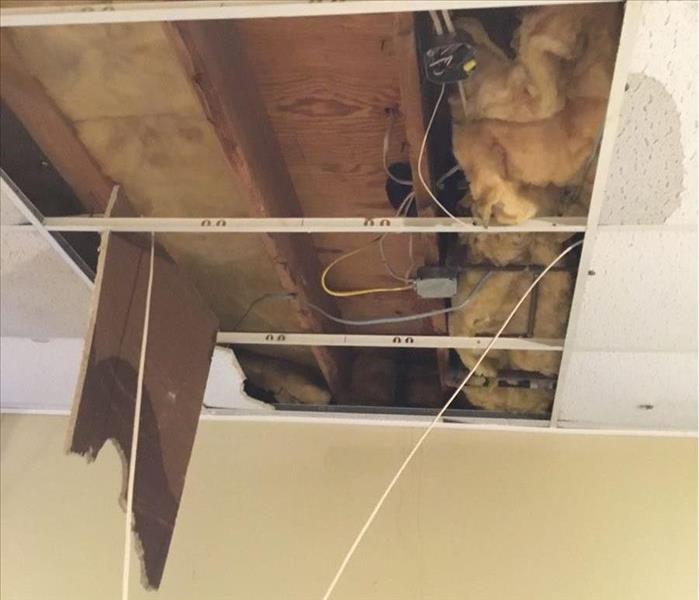 We aim to restore your property as quickly as possible, “Like It Never Even Happened.”
We aim to restore your property as quickly as possible, “Like It Never Even Happened.”
Count on SERVPRO for Stormwater Damage Repair in Denville
Stormwater originates from precipitation like heavy rain or meltwater from snow and hail. It carries dangerous wastes like sewage effluents and microorganisms that cause mold and bacteria growth. It is vital to contact service providers immediately after the stormwater subsides. Thorough communication is one of the crucial steps in stormwater damage restoration at your residence.
You need to communicate to the service providers with insights on the type and size of the damage, providing enough information so you can get the most appropriate response. You should not worry since SERVPRO has trained and competent stormwater damage repair specialists in Denville to help you through this tight spot. Some of the qualities that make us the right choice for your situation include the following:
- Our competent specialists.
- The flexibility of our restoration process to cover any situation.
- Always being prepared.
- State-of-the-art restoration equipment.
Standing water causes the accumulation of excess water in the internal environment, which makes its extraction a point of focus for SERVPRO. Our team can remove all the stormwater immediately and efficiently and bring down the humidity to normal levels. We have industrial-grade extraction pumps that are capable of moving large volumes of water in a short time. We have wet-dry vacuum driers that are efficient in sucking out excess water. We also allow ventilation of the area, which helps the drying process become more efficient.
Dehumidifiers come in handy for our SERVPRO team at this step since they speed up the process. Air movers, floor fans, and dehumidifiers help us dry the damp structures and contents. Our team uses refrigerant dehumidifiers at the beginning of a job when the humidity in the house is high. If porous materials are dry but structural materials are still damp, our SERVPRO technicians use desiccant dehumidifiers to dry them.
Drying your home shortly after storm water damage significantly limits the possible destruction. Don’t hesitate to contact SERVPRO of North Morris County at (973) 983-5657 for repairs. We’re Faster To Any Size Disaster.
SERVPRO Can Perform Storm Flood Damage Restoration in Your Denville Home
9/17/2022 (Permalink)
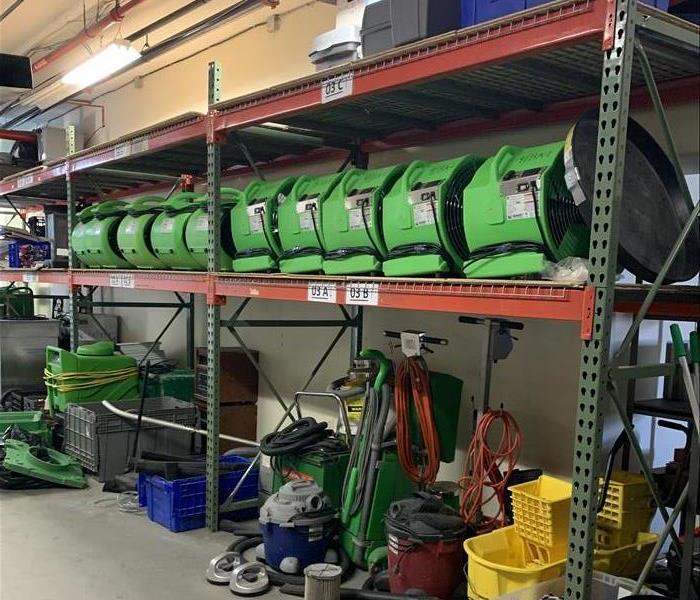 Safe flood removal for your Denville property needed? Call SERVPRO to make it "Like it never even happened."
Safe flood removal for your Denville property needed? Call SERVPRO to make it "Like it never even happened."
Storm Flood Damage in Denville Calls for Professionals
Very few things can make a homeowner feel as helpless as when faced with the risk of an external flood hitting them and the potential damages it may leave behind. To ensure your house is safe and minimize the damages, you must contact flood restoration specialists like SERVPRO.
Flood water is “black water” or category three water, which usually has contaminants, confirming the need for professionals to handle the restoration process. To minimize overall damage, we can perform storm flood damage repair in your Denville home as quickly as possible. SERVPRO is always ready to provide homeowners with the necessary restoration services should they find themselves in such a situation.
We have a rich documentation process that makes it easier for you to make claims to your insurance provider. A full restoration of your property might take multiple pathways depending on the situation, but SERVPRO’s overall process involves such steps as:
- Assessing the damages caused.
- Pumping the water left behind.
- Safe removal and disposal of any irreparably ruined contents and furnishings.
- Cleaning and decontaminating the house to remove potential chemical, biological and environmental contaminants left behind.
- Checking the building to identify structural damages that might cause hazards at the moment or in the future.
- Complete drying and dehumidification to ensure no water residues are left behind to avoid mold infestation.
Smells are among the major problems that flood damage leaves behind. At SERVPRO, we use different deodorizing techniques, products, and equipment to deal with foul odors. Our team can use dry fogging to deodorize the house since it does not pose the risk of moisture damage that wet fogging can cause. The deodorants we use in this situation are usually solvent-based. They pass through a heated space where they vaporize into small particles that can fight the odors even in the most hidden places.
If you want a fast and efficient flood damage restoration process, contact SERVPRO of North Morris County at (973) 983-5657. We’re Faster To Any Size Disaster.
The Hazards of Flood Damage in Denville Properties
7/19/2022 (Permalink)
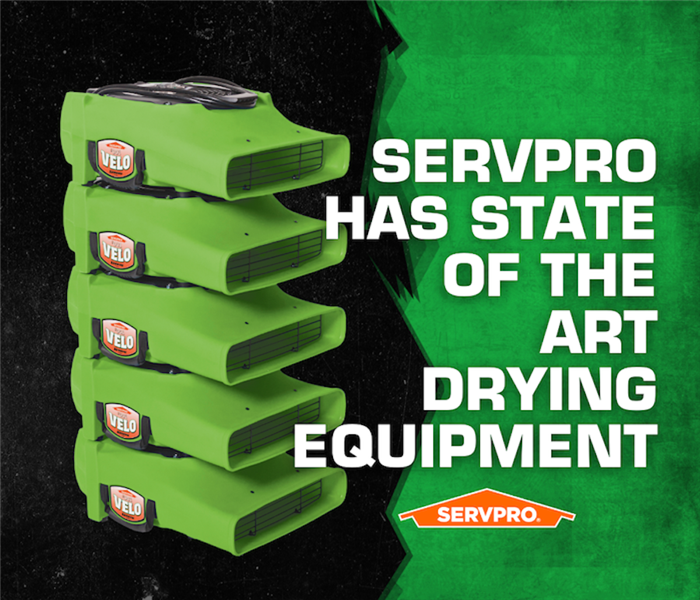 Flood damage restoration for your Denville home needs the attention of SERVPRO. We use state of the art equipment for all jobs.
Flood damage restoration for your Denville home needs the attention of SERVPRO. We use state of the art equipment for all jobs.
Flood Damage Can Destroy Homes
From rising creeks and streams around Denville to natural disasters that overwhelm the city with severe weather conditions, flooding has been a part of many homeowners' lives. We are a trusted name to help with post-flood recovery.
Structural Compromise Concerns
Flood damage to Denville homes can impact the structure the most. From the penetration point to the degradation of exposed building materials, we must complete widespread controlled demolition to help.
Safety Hazards After Flooding
The safety of our technicians and the occupants of the house is a priority of our SERVPRO team, so we work fast to identify hazards and avoid threatening situations. After flooding, there are a few common safety hazards that could exist:
- Shock Hazards – In some scenarios, standing water can pool around outlets or other electrical pathways to charge the water.
- Debris – Solids in the water and particulates carried in with the flood can present risks to the health and wellbeing of those exposed.
- Infestation – Intruding floodwater can carry insects and animals into the house that SERVPRO must remove to restore the property.
Standing Water with Solids
Water removal services can be a priority for arriving technicians, but flooding is an obstacle in many cases. Solids and debris in the water cannot be managed by all of the extraction units in our inventory. Instead, we rely on trash pumps and vacuums to remove these pools.
The Possibility of Contamination
With any flooding, contamination can only sometimes get ruled out entirely. Instead, most scenarios require water exposure and impacted materials to be treated as a blackwater event like a sewage backup. Contaminated materials must get handled carefully and disposed of, meeting strict guidelines.
Your home can be severely damaged by flooding and water intrusion. As leading flood restoration experts, SERVPRO of North Morris County works to provide rapid mitigation strategies to overcome the hazards of flooding. Call us now at (973) 983-5657.
Flood Damage in Your Denville Home? Call SERVPRO
5/17/2022 (Permalink)
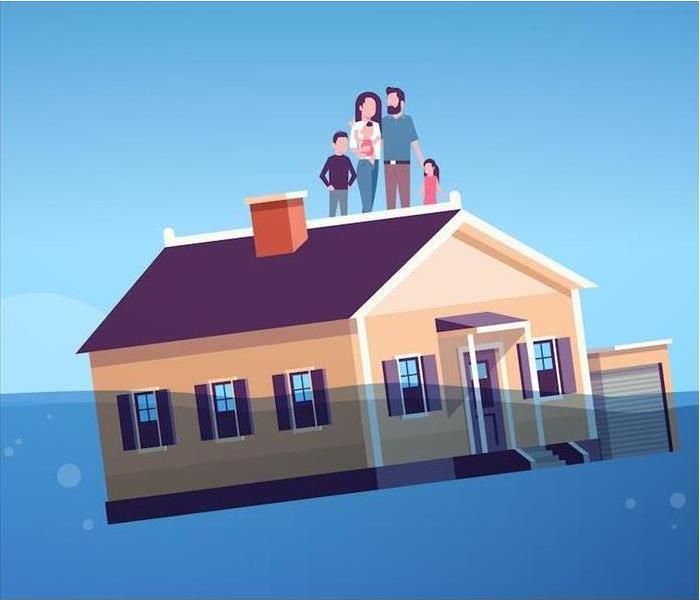 Afraid your wood floors have been damaged by a Storm? No need to stress it, Let SERVPRO fix it.
Afraid your wood floors have been damaged by a Storm? No need to stress it, Let SERVPRO fix it.
SERVPRO Uses High-tech Equipment for Flood Damage in Denville
Successful flood damage restoration of Denville homes requires sophisticated equipment and tools. SERVPRO techs know which equipment to use and how to use them for the best possible results.
Some of the equipment that SERVPRO techs use during flood damage restoration of Denville homes include:
- Moisture meters and Infra-red cameras
- Axial and centrifugal air movers
- Refrigerant and desiccant dehumidifiers
- Pumps and water extractors
- Heating and cooling equipment
In some situations, SERVPRO techs implement heating (or cooling) to speed up the drying after carefully evaluating the drying conditions.
Role Of Heating And Cooling In Water Cleanup After A Storm
When external heat is used to increase the air temperature to facilitate drying, the process is called 'heat drying.' SERVPRO techs use a heat and air exchange drying system that uses an indirect fired furnace to heat the airspace of your Denville property during flood restoration. The indirect-fired furnace takes dry outdoor air and warms it before introducing it into the drying zone. The indirect fired furnaces are installed outside the structure and can produce 100,000 to 800,000 BTU/hour of heat.
If heating a limited area is required, SERVPRO techs often use portable electric heaters that can focus heat on a small space.
Restoration technicians sometimes also use air conditioning units to increase occupant comfort and allow the refrigerant dehumidifiers to remain within their optimum range (below 90°F).
For commercial projects, SERVPRO uses a state-of-the-art direct expansion unit that can provide both heating and cooling and humidity control.
We are committed to helping the community's property owners provide industry-leading service. If you have any questions, call SERVPRO of North Morris County at (973) 983-5657.
How to Recover From Flood Damage affecting Your Denville Home
4/18/2022 (Permalink)
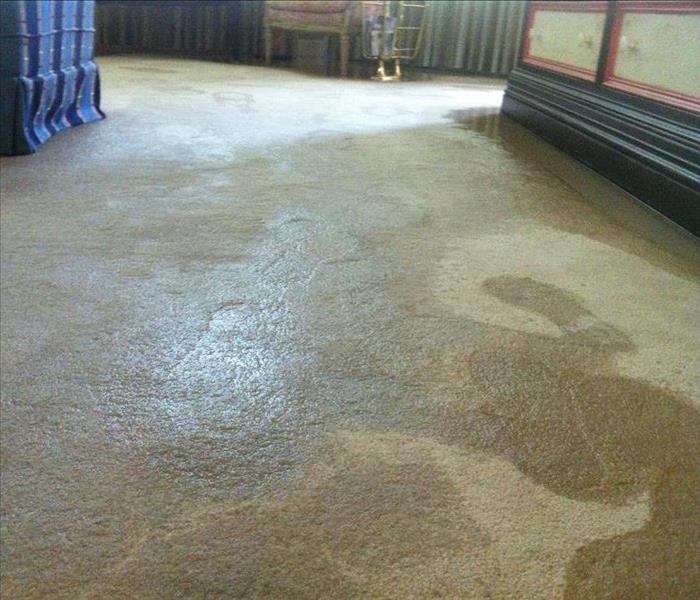 There is no job too big or small for your local SERVPRO of North Morris County.
There is no job too big or small for your local SERVPRO of North Morris County.
SERVPRO Provides Denville Homeowners with Excellent Services During Flood Repairs
Flooding is a severe problem that many homeowners have to deal with annually. Floods can cause a wide range of issues in your Denville home and, if not addressed right away, can lead to further damages and very costly repairs. Flood restoration ought to be done by professionals as they have the right tools for the job and workforce.
Flood damage repairs in Denville homes start with cleanup, which is a daunting process that must be done thoroughly. SERVPRO aims to remove all floodwater, dirt, and mud accumulated in your home, particularly in hard-to-reach areas. We have tools to make flood cleanup easier, such as submersible pumps, truck-mounted pumps, or portable extractors for immediate water removal. Our SERVPRO technicians use shovels to remove the debris and pressure washers to clean off the remnants.
Flood Damage May Cause
- Warping and buckling of hardwood floors
- Damage to furniture and fixtures
- Moisture in walls
- Ruined appliances
Managing Moisture in Some Items
Floodwater from a storm is nasty as it might be mixed with sewage leaks, chemical spills, and everyday contaminants. Cleaning items are cheaper than replacing them. However, upholstered furniture, draperies, and mattresses should be tossed. While soaked particle-board furniture may fall apart, those made of hardwood, metal, plastic, and glass should be fine once thoroughly cleaned.
Hardwood floors may survive the damage but require a lot of care. In this case, we remove a few boards here and there to allow others to expand so that they do not warp. We also monitor the subfloor because, in some situations, a hardwood floor might dry, whereas the subflooring underneath remains wet.
Dealing With a Wet Subfloor
- Inspect the subfloor
- Circulate dry air
- Apply biocides to prevent mold growth
SERVPRO of North Morris County provides 24/7 flood damage restoration service, thus helping get your home to its preloss state as fast as possible. Call us at (973) 983-5657. We're Faster To Any Size Disaster.
Different Issues Caused by Flood Damage in Denville Homes
2/11/2022 (Permalink)
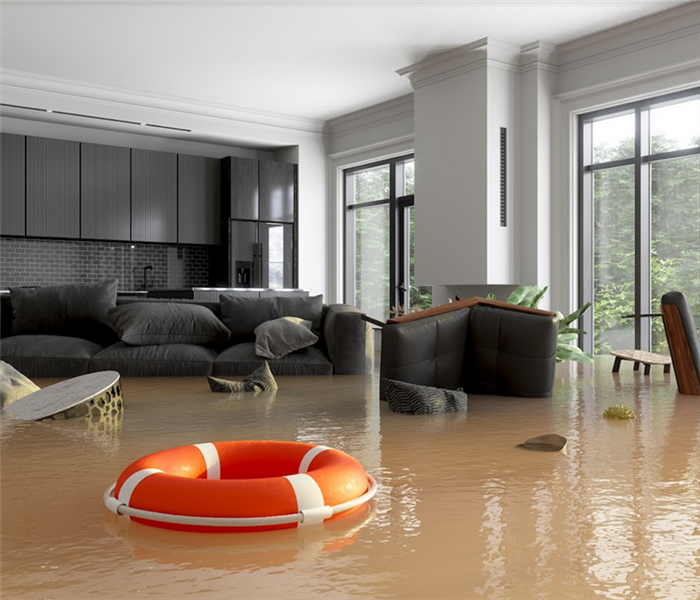 When flooding affects your home, team SERVPRO can help. Contact our certified team for effective flood damage remediation services.
When flooding affects your home, team SERVPRO can help. Contact our certified team for effective flood damage remediation services.
SERVPRO Evaluates Denville Homes After Flood Damage to Reveal Severe or Hidden Damage
A flooding incident at your Denville home can be the genesis of many problems. Resolving them can be costly, risky, or highly inconvenient. Seeking help from a professional restoration team can prevent some if not all of these problems.
The severity of an incident and time are the main factors influencing the issues you have to address after flood damage at your Denville home. Time, in this case, can mean the duration the main incident affects your property or the duration damages remain unresolved. On the other hand, severity is the level of negative forces that impact your home, whether rain, winds, or fast-moving groundwater. SERVPRO has resources to match any flooding severity.
A severe flooding incident can cause:
- Appliance damages
- Damage to structural and electrical installations
- Septic and well water system damage
- Mold contamination
Although you can anticipate many problems when you inspect how an incident affects your house, some issues can surprise you. For example, appliance damage is expected when items are submerged in floodwater or shattered by physical impact. However, high humidity can also negatively impact them by corroding internal components. SERVPRO can help by moving or covering items. Actions such as timely dehumidification also help counter the impact of flooding on electronics.
Many structural materials are vulnerable, including frames, wall panels, and ceilings. If water enters through the roof, the ceiling is left sagging. Groundwater, on the other hand, affects walls several inches or feet above the floor. Structural supports might also swell, rot or warp.
Floodwaters leave chemicals and biohazards in a home. Mold contamination can develop if the property remains flooded for over 48 hours. Our SERVPRO teams have appropriate PPE to venture into affected properties safely.
SERVPRO of North Morris County provides the resources you need after flooding. Call us at (973) 983-5657 for solutions that counter flood damage, "Like it never even happened."
What Types of Water Damage Can Occur in Denville in the Winter Time?
12/31/2021 (Permalink)
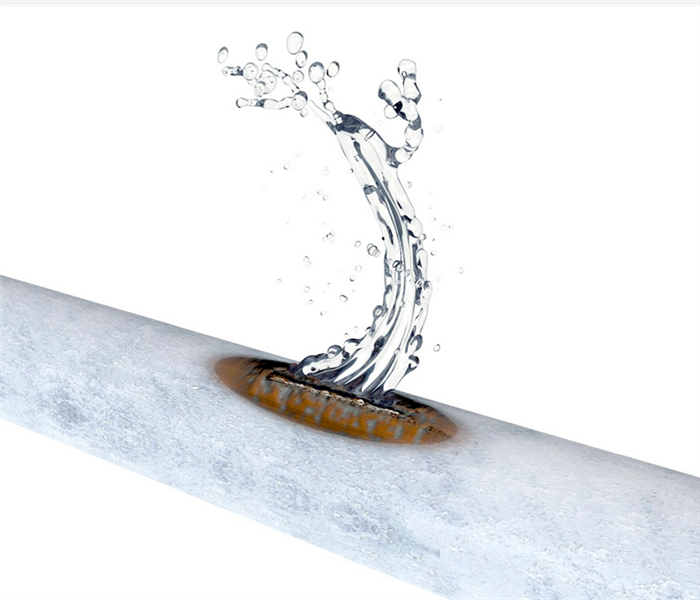 When frozen pipes bring excess water into your home, team SERVPRO can help. Contact our certified technicians right away for remediation services.
When frozen pipes bring excess water into your home, team SERVPRO can help. Contact our certified technicians right away for remediation services.
SERVPRO Can Provide Emergency Services for Water Damages in Denville
When most people think of property damage caused by storms, they think of thunderstorms and flooding conditions that mainly occur during the warmer months in the summer and spring. However, when the weather gets colder in the fall and winter, there are different issues that Mother Nature can create. Any time the temperature drops below freezing, the cold temperatures and snowstorms can become the culprits of property damage.
Frozen pipes and ice damming in Denville are the two most common types of disasters in the fall and winter. Both of these occurrences can cause excessive damage to your building materials and contents. Any time moisture gets into your dwelling, issues can arise. Luckily, our highly trained SERVPRO technicians can provide the following services to assist you:
- Flood Damage Remediation
- Clean Up After a Sewer Backup
- Repair Damage Caused by Burst Pipes
- Mitigate Issues Caused by Ice Dams
- Water Extraction Services
- Ceiling Repairs from Water Damages
Most people know the importance of keeping the heater on during the winter when out of town. When the temperature drops below freezing outside, it is possible that certain sections of your pipes can freeze. Once water freezes, it can expand and cause your pipes to burst and leak. When this occurs, hundreds of gallons of water could have leaked into your home while you are out of town. The longer your contents and building materials stay wet, the worst the damage can become.
Ice dams are also another occurrence that can cause water damage to your house. Ice dams typically occur after a snowstorm once the snow starts melting. If your roof is warmer in some sections than others, a block of ice can form on your gutters and prevent water from draining.
If you ever notice water leaking into your home due to frozen pipes or an ice dam, call SERVPRO of North Morris County at (973) 983-5657.
How Does SERVPRO Help Denville Residents Overcome Flood Damage?
11/7/2021 (Permalink)
 Leaks in your ceiling from a storm? SERVPRO storm and flood damage remediation techs are top-notch. We have you covered from start to finish.
Leaks in your ceiling from a storm? SERVPRO storm and flood damage remediation techs are top-notch. We have you covered from start to finish.
Our Variety of Flood Damage Cleanup and Repair Services Help Homeowners Recover.
As with most of New Jersey, Denville often experiences the effects of coastal storms and the state’s notoriously rainy weather. Rest assured, though, that companies like SERVPRO have a portfolio of services that can successfully resolve whatever flood-related issues your home may suffer as a result of this stormy weather.
Returning homes to their pre-storm condition is one of the things Denville flood damage remediator SERVPRO does best. Our biohazard remediation experts are skilled in performing all kinds of storm damage cleanup and restoration work. They routinely perform water removal services, basement flooding cleanup, sewage cleanup, and water damage remediation. Specifically, our highly-trained technicians:
- Promptly arrive, usually within four hours of your initial call, to thoroughly evaluate your home’s flood damage
- Employ powerful water extractors to clear basements and first floors of large pools of standing water
- Scientifically return your home to its normal interior humidity using air movers, dehumidifiers, and Injectidry systems, as well as regional environmental data and high-tech moisture measurement devices like Thermo hygrometers and moisture meters
- Eliminate microbial threats by professionally disposing of hazardous waste and fogging impacted areas/surfaces with commercial-grade disinfectants and antifungals
- Fully deodorizing your flood-damaged home with powerful deodorants to eliminate persistent odors
- Reconstruct irreparably harmed structural elements and sections of your residence
All of these measures are essential to return your living space to its pre-flood state and, unlike many other area services, we are usually able to perform them quickly and effectively.
So, if you are ever unfortunate enough to experience flooding, don’t hesitate to call your helpful neighbors at SERVPRO of North Morris County. We are always ready to remediate your flood damage at (973) 983-5657.
SERVPRO Offers Fast Response After Flood Damage to your Rockaway Home
9/21/2021 (Permalink)
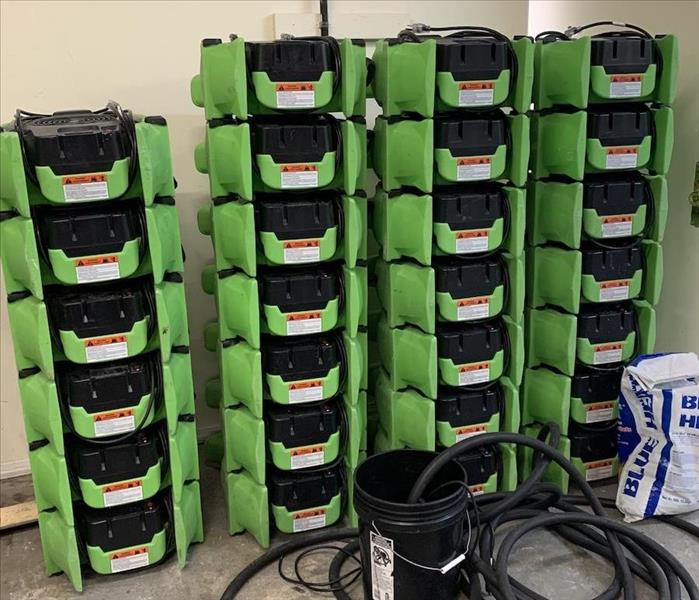 Storm waters may have viruses and bacteria in them. SERVPRO has the manpower and equipment for any size disaster. Call now!
Storm waters may have viruses and bacteria in them. SERVPRO has the manpower and equipment for any size disaster. Call now!
Storms & Flood Damage Create Safety Hazards – Let SERVPRO Help
Catastrophic flood damage in Rockaway causes immediate hardship and additional damage to contents and structures if water is not removed and everything dried immediately. All of your contents are fully immersed in contaminated floodwaters; mold colonies can rapidly grow, leading to further damage. Mold can cause health effects for many consumers, and numerous safety issues can materialize.
SERVPRO has the equipment and staff to respond to emergency flood damage in Rockaway and surrounding areas. We can mobilize truck-mounted pumps to begin removing water and contaminated materials from flooded basements in less than four hours from your call. It is important it is to remove water, damaged contents and begin drying to avoid mold growth, which often begins in as little as 24 to 48 hours.
Residents should be cautious about entering their homes after flooding. There may be several hazards that need to be considered.
- Slips and falls on surfaces contaminated with mud,
- Chemicals and biological material, including viruses and bacteria
- Electrical systems that are compromised,
- Sharp edges from broken glass and other personal items that were damaged during the storm.
Our SERVPRO technicians are on the lookout for all of these hazards as they begin removing water and debris as well as damaged materials. We make sure your home is safe to enter for you and our cleaning staff as we begin restoring your home to its original condition, “Like it never even happened.” We keep you safe, and our fast response mitigates the total damage caused by floodwaters.
Call SERVPRO of North Morris County for flood damage in Rockaway and surrounding areas. We can help 24/7. Call (973) 983-5657.
What Strategies Best Remove Flood Water from Denville Basements?
7/9/2021 (Permalink)
 We’re Faster to Any Size Disaster.
We’re Faster to Any Size Disaster.
We Have an Assortment of Recovery Tools to Remove Standing Water in Denville Homes.
Flooding requires fast and deliberate action to resolve. Because flood water can be so destructive to areas like the basement, and encourage secondary effects like mold growth, skilled restoration professionals like our SERVPRO team are ready to help 24/7.
Are There Multiple Extractors Available?
Flood removal for Denville homes involves several extractors. Because the conditions of flooded areas in the house can vary substantially, having several water removal tools arriving on-site simultaneously is valuable for eliminating surface water concerns.
How Soon Can Debris Removal and Cleanup Start?
After water removal occurs, our team can focus on eliminating any debris and muck present in the basement. Surfaces like masonry and concrete flooring can be coated with many foreign substances that require a wet vacuum and other cleaning methods to remove. Some threats include:
- Mud
- Silt
- Bacteria
- Organic matter
- Insects
Can Water Damage Repairs Happen Quickly?
Repairs are often necessary to recover after flood damage, which makes the general contractor license of our SERVPRO team a valuable commodity. Because water penetration can be destructive to masonry and other construction elements used in the basement or foundation of the house, many repairs or even reconstruction needs exist to make flooding “Like it never even happened.”
Flooding can be a disastrous situation for area homes. Give our SERVPRO of North Morris County team a call today to help at (973) 983-5657.
How Does SERVPRO Manage Natural Flooding in Rockaway Homes?
6/24/2021 (Permalink)
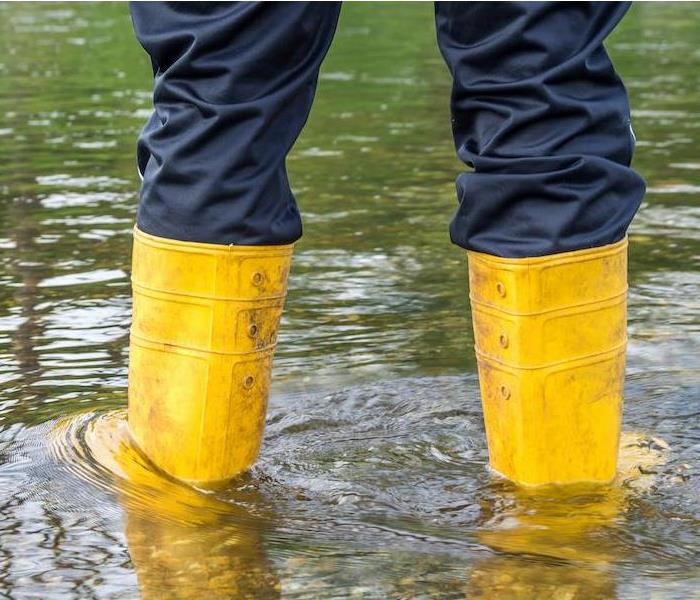 Our experienced SERVPRO teams are prepared to handle your flood damage day or night. Just give us a call.
Our experienced SERVPRO teams are prepared to handle your flood damage day or night. Just give us a call.
From Extraction to Surface Cleaning, We Can Help Rockaway Properties After Disasters.
Natural flooding can be a hazardous situation for homes in the area, primarily because of the contaminants and foreign debris carried into the property. However, with swift action to mitigate standing water and possible contamination, our SERVPRO team can help. We often begin this process by determining the best method for avoiding the further spread of water and contaminants.
Establishing Engineering Controls to Prevent Contamination Spread
Preventing the spread of contaminants after flood damage in Rockaway homes is a critical process. Exposed bulk materials and building elements can be overwhelmed by pathogenic threats and wastewater, making the elimination of these threats crucial as well. Contaminants can be aerosolized by many of the flood restoration actions, so building containment protects unexposed areas of the house.
Water Removal and Debris Cleaning
After flooding, removing standing water is a priority of our responding SERVPRO team. Considerations must be made with natural flooding situations to remove both the water and possible solids and debris present in the pooling. Some of the extraction devices used here include:
- Self-priming trash pumps
- Wet vacuums
- Truck-mount extractors with wands
Flood restoration involves many steps and stages, from containment to water removal. Our SERVPRO of North Morris County team can help however your property needs with our fast response and expertise. Give us a call today at (973) 983-5657.
Does SERVPRO Provide Emergency Storm Damage Remediation in Denville?
5/12/2021 (Permalink)
 Strong storms are a regular occurrence in our area. Should you experience storm and flood damage, call SERVPRO! We are always on call.
Strong storms are a regular occurrence in our area. Should you experience storm and flood damage, call SERVPRO! We are always on call.
Can SERVPRO Help with Storm Damage Remediation in Denville?
Storms on the east coast can cause a great deal of damage. There can be broken windows, holes in your roof, and water surging through your home in severe flooding situations.
SERVPRO provides fast response and emergency storm damage remediation to Denville residents and business customers. If you have a leaking roof from storm damage, we can provide an emergency roof tarp. We can also board broken windows to prevent additional storm damage. We can help our neighbors deal with emergency water damage from storms.
Many business owners and residents may not realize that in addition to responding 24/7 to emergency calls, removing debris, water, contaminants, cleaning, and drying the structure, we also can help in many other ways. For example, we provide:
- Temporary warehouse space to store contents and valuables to keep them safe and dry.
- We remove damaged drywall and install new drywall
- We repair floors – carpeting, tile, and hardwood that has been damaged
Our team of SERVPRO professionals aims to repair your home, “Like it never even happened.”
Call SERVPRO of North Morris County for storm damage services in Denville and surrounding areas. We can help 24/7. Call (973) 983-5657.
How Does Flood Damage Generally Impact Rockaway Residents?
4/21/2021 (Permalink)
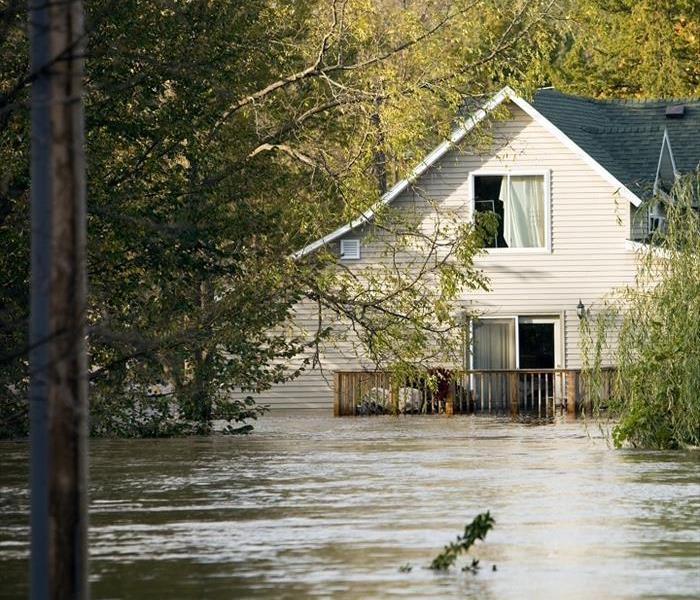 Did you know that floodwater contains contaminants? SERVPRO can safely remove the water.
Did you know that floodwater contains contaminants? SERVPRO can safely remove the water.
Storms and the Flood Damage They Cause Affect Local Homeowners in Various Ways
On average, New Jersey tends to be a rainy state that experiences more than its share of flooding events. Our state is divided into two climatic zones and based its position on the East Coast. Rockaway itself sits nearly on the imaginary line where a hotter, more humid climate meets colder, drier northern weather. This meteorological clash, of course, produces volatility in the atmosphere and powerful rainstorms during the spring-summer and fall-winter seasonal changes. Then, throughout the year, the Garden State’s coastal position makes it susceptible to the unforgiving onslaught of tropical storms, hurricanes, and Nor’easters.
The Nature of Rainstorms in the Rockaway Area
As noted before, powerful rainstorms are a common occurrence in the Rockaway area and can occur at any time of the year. Moreover, they arise from cyclonic storms and result from the meeting of hot, humid air and cooler, drier air in this climate transition area. This situation generally happens when the seasons change, but sometimes can occur during periods of hot weather, and it produces strong thunderstorms and torrential downpours. As inches of rain rapidly accumulate, the Rockaway River that bisects the township often overflows its banks and sometimes inundates nearby homes and businesses.
Cyclonic Storms that Have Impacted This Part of New Jersey
More well-known are the numerous tropical storms, hurricanes, and Nor’easters that have devastated North Jersey. These violent natural disasters have blown roofs off local houses, inundated cars and homes in feet of floodwater, caused long-term water damage and mold-related issues, and cost this part of New Jersey billions of dollars over time. Some of the more notable of these destructive weather phenomena include:
- The Great Atlantic Hurricane of September 1944, which dumped between six and ten inches of rain on the Rockaway area over four days
- “The Storm of the Century,” a Nor’easter in November 1950 that brought strong winds and substantial flooding to North Jersey
- Hurricane Irene, an August 2011 storm that dropped around ten inches of rain on Rockaway and was particularly damaging to the township’s environs
- Superstorm Sandy, an October 2012 superstorm that caused billions of dollars of damages all across New Jersey
So, with all this in mind, always be prepared for flooding events and call SERVPRO of North Morris County at (973) 983-5657 whenever you need flood damage clean up.
What Kinds of Flood Damage Do Rockaway Residents Usually Suffer?
Unlike clean water, floodwaters do more substantial and immediate damage to the homes in which they come into contact. These waters are often polluted with everything from human and animal wastes to petroleum products and toxic chemicals. Some of the flood-related damages Rockaway homeowners most often experience are:
- Toxic floodwater deposits that require professional biohazard remediation
- Wastewater system backups that necessitate sewage cleanup services
- Basement flooding involving inches to feet of standing water
- Various kinds of microbial damage that requires expert water damage repairs
- Persistent and omnipresent flood-related odors that are neutralized by industrial-grade deodorization efforts
Regardless of what type of flood damage you experience, your neighborhood SERVPRO of North Morris County can help. Call us anytime at (973) 983-5657 for assistance.
Winter Storm Alert - Be Prepared!
1/29/2021 (Permalink)
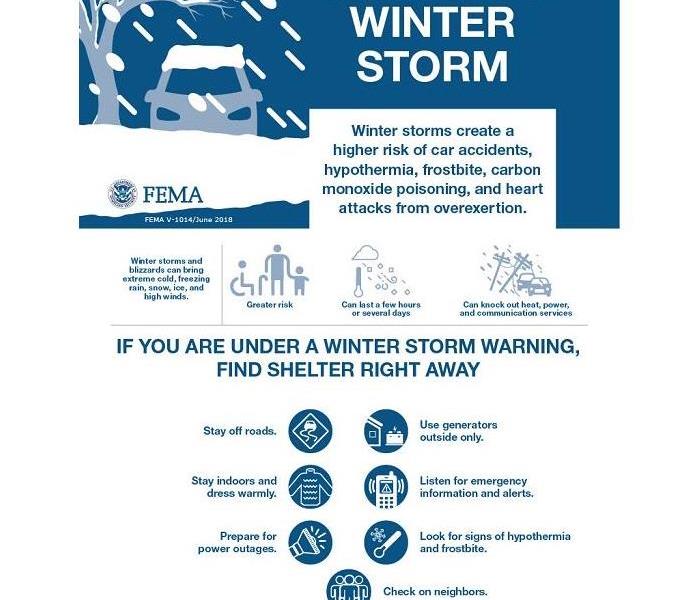 FEMA Winter Emergency Tips
FEMA Winter Emergency Tips
We are gearing up for another possible winter storm with moderate to heavy snow accumulation here in Morris County and much of the Northeast. We have all heard about getting and being prepared for winter storms. Take a few moments now to review your home and vehicle emergency kits. Do I need supplies? Don’t wait until Sunday or Monday when it has already started snowing to panic shop! Now is the time to get out there and replenish dwindling supplies of food, medications and any personal items you may need for yourself, your family and your pets.
Keep checking up on the forecast so you know what to expect!
FEMA has a quick video with important reminders for snow related preparedness here: https://www.youtube.com/watch?v=XVpGJ_Xl__w&list=UUVrYey5SZMid_VZk9D8tYmA
Power outages are a frequent occurrence in our area during and after snow events. If you haven’t already done so, add the JCP&L Power Outage Line contact information into your phone or go here: https://www.firstenergycorp.com/outages_help/Report_Power_Outages.html
Set a reminder to charge up your devices and battery back-ups.
Many local communities have Emergency Alert Systems. To sign up for Alert Morris, our county’s emergency notification system, go here: https://oem.morriscountynj.gov/alerts/
If you have no internet connection and need to reach Morris County Emergency hotline by phone: Morris County Emergency Hotline Phone Number: 973-400-6611
If you are in need of food or shelter, go to the Red Cross site here: https://www.redcross.org/get-help/disaster-relief-and-recovery-services/find-an-open-shelter.html
If snow, ice, wind, rain, fire or smoke has damaged your home or business, call us: SERVPRO® of North Morris County 973-983-5657. We are here to help!
October and November Ice and Snow
9/30/2020 (Permalink)
Ice and snow storms in October and November are possible here in Northwest Morris County. When overnight temperatures plummet and freeze warnings are posted, we are reminded that hazardous weather is ahead. The calendar does not have to read “December” for an ice event. We have already had overnight temperatures in the 30s. Last November we experienced extensive property damage in our county from ice accumulating on trees that were still full of leaves. The weight of the ice caused trees to crack and branches to fall, which in turn caused damage to property and personal injury. As in any storm situation, preparedness is the key!
- Before the leaves fall, assess tree and branch health, especially to those trees overhanging your home.
- Consult a professional to cut back dead branches and dead or unhealthy trees.
- Reassess your homeowners insurance - decide if you need additional riders for things like loss of food due to power failures
- Have an emergency evacuation plan in place and a “go bag” packed in case you need to speedily exit your home
- Download the SERVPRO™ App on your mobile device
Last but not least, add SERVPRO™ of North Morris County to your emergency contact list. We will guide you through the process of restoring your property to preloss condition. We will work with your insurance company. We will treat your home as we would our own. We are here for you, 24/7/365.
Replenish Those Emergency Kits!
6/26/2020 (Permalink)
If these past months of 2020 have taught us anything, it’s this: Be Prepared! Be prepared for anything. With Hurricane Season off to a quick and busy start, it is essential that we be prepared for weather-related disasters that could disrupt our daily lives. If we had a home emergency kit prepared, we may have depleted some of those staples due to stores being closed, supplies being scarce and sheer necessity during the COVID-19 pandemic. Now that the economy is beginning to open again and supplies are starting to get easier to acquire, we need to replenish our home emergency kits and perhaps consider a few other types of emergency kits so we can be ready in any emergency.
First consider what types of emergencies you may encounter.
- Sheltering at home or quarantine, as we have been experiencing with COVID-19, requires a well-stocked home emergency kit with the typical supplies and additional food and personal items, since the store shelves were nearly empty in Morris County. For a list of stay at home emergency supplies for your family home kit, visit FEMA.gov here: https://www.fema.gov/media-library-data/1584362227817-a2800c83ada65c68cdaaa34d7f7729e0/checklist.pdf You may have to adjust this list according to your own personal needs and those of your family.
- Evacuating your home. If you live in a flood prone area or experience a hurricane or wildfire, you may need to leave with only a few minutes notice. In this case you would need a Bug-Out-Bag (BOB). Everything you need packed in a backpack, duffel bag or even plastic totes which are stored near the door for a quick exit. This typically includes the supplies mentioned above, as well as a change of clothing, important insurance documents, and some additional items. The American Red Cross has some suggestions here: https://www.redcross.org/get-help/how-to-prepare-for-emergencies/survival-kit-supplies.html
- Evacuating your office or place of business. A backpack that would contain the essentials to get you home in case of a larger emergency that disrupts transportation. Consider these items: water bottles, enough to stay hydrated if you have to walk home; sneakers or sturdy shoes; a change of clothes; cash; N-95 mask; small first aid kit; nuts or nutrition bars. This bag could be kept under your desk or in your vehicle.
No matter what the situation requires, being prepared and having a plan will help us stay calm and focused. If your home or business suffers any type of disaster, we are here to help.
Call us anytime, 24/7/365 @ 973-983-5657. SERVPRO® of North Morris County is prepared to assist you to make it "Like it never even happened."
National Hurricane Preparedness Week 2020
4/30/2020 (Permalink)
National Hurricane Preparedness Week, May 3-9, 2020
The First Week of May is set aside for National Hurricane Preparedness Week. The Atlantic Basin’s typical Hurricane Season begins on June 1st and runs through November. However, A tropical cyclone can occur at any time. Mother Nature doesn’t always obey the calendar!
This season’s forecast was released this month by researchers at Colorado State University. The outlook calls for a total of 16 named storms during the Atlantic hurricane season. Of those, researchers expect eight to become hurricanes and four to reach major hurricane strength.
National Hurricane Preparedness Week is the perfect time to talk about hurricanes, although some of the activities set forth for this week may be subject to the latest health and safety guidelines from the CDC and our local officials.
The main outline for Preparedness Week:
- Determine Your Risk
- Develop and Evacuation Plan
- Assemble Disaster Supplies
- Get an Insurance Check-up
- Strengthen Your Home
- Help Your Neighbor
- Write Out Your Plan
It’s never too early to be prepared! Take some time this week, before hurricane season, to make a plan!
For a personalized Emergency Ready Plan (ERP) for your business, call SERVPRO of North Morris County at 973-983-5657.
For additional resources, visit the National Weather Service website: https://www.weather.gov/wrn/hurricane-preparedness
To visit FEMA’s Make a Plan site: https://www.ready.gov/make-a-plan
High Wind and Sump Pump Failure
4/27/2020 (Permalink)
Perhaps you live in an area with a high water table, and your sump pump is working regularly to keep the water out. Here in Morris County we have had high wind warnings several times over the past few weeks causing limb damage to surrounding trees. The high winds did not accompany heavy rain, but just a few hours without electricity can mean disaster for your home if you depend upon a sump pump.
Unless your sump pump is backed up by a battery or generator, it will not pump water out from under your foundation when there is a power outage. Without the pump operating, you may experience water seeping into your basement through the foundation. No problem, you think. I have homeowner’s insurance, that will cover it, you reason to yourself. Not necessarily.
At SERVPRO of North Morris County, we have been called by countless neighbors and friends who have experienced water intrusion into their home due to sump pump failure. After assessing the damage and speaking with their insurance company, we have had to break the bad news to them that this situation is not considered a covered loss and they will have to pay for it out-of-pocket!
Homeowners insurance typically does not cover seepage or any other water emergency that is caused by nature unless you have a flood policy or a rider for your sump pump. There is a dollar-value limit on this coverage. Don’t be caught unaware. Check your policy and make the necessary adjustments.
Sump pump owners beware! If you have a back-up plan in case of a power outage, good for you! If not, it would serve you well to remedy that now, before disaster strikes. Being ready for a storm emergency brings peace of mind.
Flooding - A Very Common Occurence
3/19/2020 (Permalink)
According to the National Weather Service (NOAA), “Approximately seventy-five percent of all Presidential disaster declarations are associated with flooding.” NOAA lists the most common flood hazards in the United States as:
- Flash Flooding
- River Flooding
- Storm Surge and Coastal Inundation from Tropical and Non-Tropical Systems
- Burn Scars/Debris Flows (Caused by Wildfires)
- Ice/Debris Jams
- Snowmelt
- Dry Wash (Caused by heavy rainfall in dry areas)
- Dam Breaks/Levee Failure
Floods are one of the most common and widespread natural disasters in the United States. Whether your home or business is near a coastline, near a river, or even in the desert, there is always potential for flood damage. Fema.gov reports in the last five years, all 50 states have experienced floods or flash floods.
Just because you haven’t experienced a flood in the past does not mean you won’t in the future. In fact, nearly 20% of all flood insurance claims come from moderate-to-low risk areas, and even just one inch of flood damage in an average home can cost you up to $27,000 worth in damages.
According to the American Red Cross, floods cause more damage in the U.S. every year than any other weather related disaster.
The American Red Cross offers the following flood safety tips.
- Stay away from floodwaters. If you come upon a flowing stream where water is above your ankles, stop, turn around, and go another way. Six inches of swiftly moving water can sweep you off your feet.
- If you approach a flooded road while driving, turn around and go another way. If you are caught on a flooded road and waters are rising rapidly around you, get out of the car quickly and move to higher ground. Most cars can be swept away by less than two feet of moving water.
- Keep children out of the water. They are curious and often lack judgment about running water or contaminated water.
If a flood does strike your home or business, contact SERVPRO® of North Morris County franchise professionals. Even minor floods have the potential to cause major damage to a structure when not treated quickly and properly, and the cleanup is often an overwhelming task. SERVPRO® of North Morris County’s team is prepared to handle any size disaster. When fire and water take control of your life, SERVPRO® will help you take it back.
When Temperatures Plummet
1/27/2020 (Permalink)
When a winter storm or disaster strikes, SERVPRO’s Disaster Recovery Team is poised and “Ready for whatever happens.” With a network of more than 1,700 Franchises, the SERVPRO System strives to be faster to any size disaster. Strategically located throughout the United States, SERVPRO’s Disaster Recovery Team is trained and equipped to handle the largest storms and highest flood waters.
Providing experience, manpower, equipment, and other resources, the Disaster Recovery Team assists SERVPRO of North Morris County. SERVPRO’s Disaster Recovery Team has responded to hundreds of disaster events. In the aftermath of a disaster, there is only one objective, to help you make it “Like it never even happened.”
The 2015 Siberian Express saw record sub-zero temperatures caused major problems for a large portion of the country stretching from Florida to Maine. The Midwest also experienced record-breaking low temperatures, resulting in frozen pipes and ice dams causing major problems for residents. The Storm Team dispatched a total of 257 crews from 108 Franchises to assist local SERVPRO Franchises, completing nearly 2,000 jobs.
The 2014 Polar Vortex saw record low temperatures caused by a break in the North Pole’s polar vortex resulted in an unprecedented freezing event, spanning from east of the Rocky Mountains to as far south as Central Florida, affecting all or part of 39 states and 70 percent of the SERVPRO Franchise System.
We're not out of the winter yet. When frozen pipes cause havoc in your life, call SERVPRO of North Morris County
Tornadoes in New Jersey?
10/1/2019 (Permalink)
Being prepared for a tornado is something we, in North Morris County, have rarely had to think about. Although tornadoes are rare in NJ, as of August this year there have been 8 recorded tornadoes in the state. A tornado can be a stressful and scary situation. Knowing what to do, as in any other weather emergency, is important and can help protect you and your family.
The following tips are courtesy of the CDC.gov
Some tornadoes strike rapidly, without time for a tornado warning, and sometimes without a thunderstorm in the vicinity. When you are watching for rapidly emerging tornadoes, it is important to know that you cannot depend on seeing a funnel: clouds or rain may block your view.
These weather signs may mean that a tornado is approaching:
A dark or green-colored sky
A large, dark, low-lying cloud
Large hail
A loud roar that sounds like a freight train
If you notice any of these weather conditions, take cover immediately, and keep tuned to local radio and TV stations or to a NOAA weather radioExternal.
REMEMBER: If severe weather does hit; SERVPRO of North Morris County is ready 24/7 to help you to regain control of your life! Please call us at 973-983-5657 or visit us at http://www.SERVPROnorthmorriscounty.com/.
For additional information, visit the CDC’s website at: https://www.cdc.gov/disasters/tornadoes/index.html
Hurricane Season Safety Tips
7/9/2019 (Permalink)
Hurricane season started June 1st, so before it's too late, this may be a good time to review some safety tips.
1. If you live in a high wind or hurricane-prone area and do not have tested and code-approved shutters for protection from windborne debris, consider temporarily protecting your doors and windows by mounting exterior grade, 7/16" minimum thickness plywood and fastening it into place. Visit www.flash.org for detailed instructions on how to use plywood for emergency board-up.
2. Consider building or retrofitting to create a tornado-safe room in your home. Follow ICC/ NSSA 500 Standard for detailed construction information and to ensure you achieve the highest level of protection for your family.
3. In wildfire prone areas, remove fine (dead grass, leaves, etc.) and coarse (dead twigs, branches, etc.) fuels within 30 feet of a building to create a survivable space in case of wildfire. Be sure to remove dry leaf and pine litter from roofs, rain gutters, decks, and walkways. Follow ICC’s International Wildland-Urban Interface Code® for detailed requirements.
4. Flooded roads could have significant damage hidden by floodwaters. Never drive through floodwaters or on flooded roads. Do not attempt to cross a flowing stream. It takes only six inches of fastflowing water to sweep you off your feet and two feet of water to move an SUV-sized vehicle.
National Hurricane Preparedness Week
5/6/2019 (Permalink)
According to the National Oceanic and Atmospheric Administration or NOAA, the Atlantic hurricane season is right around the corner. It typically runs from June 1 through November 30 but there is nothing magical about these dates, tropical cyclones can appear almost anytime.
This season’s forecast was released today by The Weather Company, an IBM Business. The outlook calls for a total of 14 named storms, seven hurricanes and three major hurricanes.
National Hurricane Preparedness Week is the perfect time to talk about hurricanes. Although the friends and neighbors of SERVPRO of North Morris County reside approximately 50 miles from the Atlantic Coast, a typical hurricane can be up to 300 miles wide. Many of us remember the devastation along the coast from Hurricanes Sandy and Irene. Although we don’t have to worry about storm surge in North Morris County, the damage here from these storms was caused by sustained high winds, super cells and flooding.
It’s never too early to be prepared! Take some time this week, before hurricane season, to make a plan!
For a personalized Emergency Ready Plan (ERP) for your business, call SERVPRO of North Morris County at 973-983-5657.
For additional resources, visit the National Weather Service website: https://www.weather.gov/wrn/hurricane-preparedness
To visit FEMA’s Make a Plan site: https://www.ready.gov/make-a-plan
Be Flood Smart
3/21/2019 (Permalink)
Floods are one of the most common and widespread
natural disasters in the United States. Whether your home or business is near a coastline, along city streets, in the mountains, near a river or even in the desert-there is always potential for flood damage. Floodsmart.gov reports, in the last five years, all 50 states have experienced floods or flash floods.
According to the American Red Cross (ARC), floods cause more damage in the U.S. every year than
any other weather-related disaster. The ARC offers the following flood safety tips:
- Stay away from floodwaters. If you come up on a flowing stream where water is above your ankles,
stop, turn around and go another way. Six inches of swiftly moving water can sweep you off of your feet.
-If you approach a flooded road while driving, turn around and go another way. If you are caught on
a flooded road and waters are rising rapidly around you, get out of the car quickly and move to higher ground.
Most cars can be swept away by less than two feet of moving water.
-Keep children out of the water. They are curious and often lack judgment about running water or contaminated water.
If a flood does strike your home or business, contact SERVPRO of North Morris County. Even minor floods have the potential to cause major damage to a structure when not treated quickly and properly, and the cleanup is often an overwhelming task. We are prepared to handle any size disaster. When fire and water take control of your life, we will help you take it back.
Hurricane Hazards
8/23/2018 (Permalink)
Hurricane season has already begun and several named storms have developed in the Atlantic, Caribbean or Gulf of Mexico. For the Atlantic, the season begins June 1 and runs through November 30. On average, there are 12 tropical storms that develop, with an average of six becoming hurricanes, according to the National Weather Service.
Hurricanes can be life-threatening as well as cause serious property damage. The National Weather Service lists the following as potential “hurricane hazards.”
-Storm surge is the abnormal rise of water generated by a storm’s winds. This hazard is historically the leading cause of hurricane related deaths in the United States. Storm surge and large battering waves can result in large loss of life and cause massive destruction along the coast. Storm surge can travel several miles inland, especially along bays, rivers and estuaries.
-Flooding from heavy rains is the second leading cause of fatalities from landfalling tropical cyclones. Widespread torrential rains associated with these storms often cause flooding hundreds of miles inland. This flooding can persist for several days after a storm has dissipated.
-Winds from a hurricane can destroy buildings and manufactured homes. Signs, roofing material and other items left outside can become flying missiles during hurricanes.
-Tornadoes can accompany landfalling tropical cyclones. These tornadoes typically occur in rain bands well away from the center of the storm
- Dangerous waves produced by a tropical cyclone’s strong winds can pose a significant hazard to coastal residents and mariners. These waves can cause deadly rip currents, significant beach erosion and damage to structures along the coastline, even when the storm is more than a 1,000 miles offshore.
Preparation is the best protection against the dangers of a hurricane. Plan an evacuation route and your emergency plan, take inventory of your property and take steps to protect your home or business.
Disaster Safety Tips
6/15/2018 (Permalink)
1. If you live in a high wind or hurricane-prone area and do not have tested and code-approved shutters for protection from windborne debris, consider temporarily protecting your doors and windows by mounting exterior grade, 7/16" minimum thickness plywood and fastening it into place. Visit www.flash.org for detailed instructions on how to use plywood for emergency board-up.
2. Consider building or retrofitting to create a tornado-safe room in your home. Follow ICC/ NSSA 500 Standard for detailed construction information and to ensure you achieve the highest level of protection for your family.
3. In wildfire prone areas, remove fine (dead grass, leaves, etc.) and coarse (dead twigs, branches, etc.) fuels within 30 feet of a building to create a survivable space in case of wildfire. Be sure to remove dry leaf and pine litter from roofs, rain gutters, decks, and walkways. Follow ICC’s International Wildland-Urban Interface Code® for detailed requirements.
4. Flooded roads could have significant damage hidden by floodwaters. Never drive through floodwaters or on flooded roads. Do not attempt to cross a flowing stream. It takes only six inches of fastflowing water to sweep you off your feet and two feet of water to move an SUV-sized vehicle.
The FEMA App
5/11/2018 (Permalink)
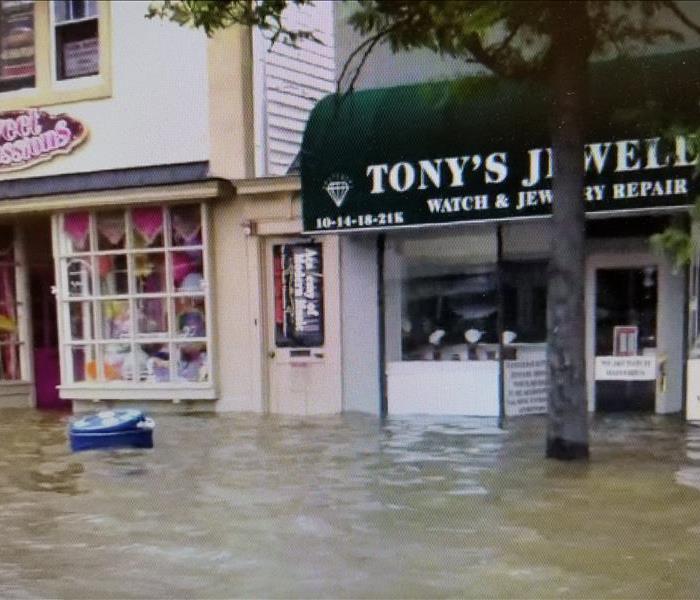 The devestation of a catastrophic storm can affect your home or business
The devestation of a catastrophic storm can affect your home or business
Be prepared to weather the storm with the FEMA App.
This app allows you to get National Weather Service alerts for up to five locations to keep you informed on-the-go. It also has information on what to do before, during, and after different disasters.
In the midst of an emergency, the app can give you directions to open shelters nearby, help you locate someone to talk to at a Disaster Recovery Center, and let you share images of damage and recovery efforts to help first responders and emergency managers.
This app is available to download for free for iOS and Android at the Apple Store and on Google Play
Severe Weather Safety
3/31/2018 (Permalink)
Severe weather can happen any time, anywhere. Each year, Americans cope with an average of the following intense storms: 10,000 severe thunderstorms, 5,000 floods or flash floods, 1,300 tornadoes, and 2 landfalling deadly hurricanes.
Approximately 98 percent of all presidentially declared disasters are weather-related, leading to around 650 deaths per year and nearly $15 billion in damage.* Knowing your risk of severe weather, taking action, and being an example are just a few steps you can take to be better prepared to save your life and assist in saving the lives of others.
Know Your Risk. The first step to becoming weather-ready is to understand the type of hazardous weather that can affect where you live and work, and how the weather could impact you, your business, and your family. Check the weather forecast regularly, obtain a NOAA Weather Radio, and learn about Wireless Emergency Alerts. Severe weather comes in many forms, and your shelter plan should include all types of local hazards.
Take Action. Take the next step in severe weather preparedness by creating a communications plan for your home and business. Put together or purchase an emergency kit. Keep important papers and valuables in a safe place.
Be an Example. Once you have taken action to prepare for severe weather, share your story with co-workers and family and friends on Facebook or Twitter. Your preparedness story will inspire others to do the same.
In a disaster, SERVPRO is "Ready for whatever happens."
1/30/2018 (Permalink)
When a storm or disaster strikes, SERVPRO’s Disaster Recovery Team is poised and “Ready for whatever happens.” With a network of more than 1,700 Franchises, the SERVPRO System strives to be faster to any size disaster. Strategically located throughout the United States, SERVPRO’s Disaster Recovery Team is trained and equipped to handle the largest storms and highest flood waters. Providing experience, manpower, equipment, and other resources, the Disaster Recovery Team assists SERVPRO of North Morris County. SERVPRO’s Disaster Recovery Team has responded to hundreds of disaster events. In the aftermath of a disaster, there is only one objective, to help you make it “Like it never even happened.”
2017 Hurricane Harvey: Category 4 Hurricane Harvey hit Texas on August 26 with winds of 130 mph. The hurricane made a second landfall just hours later and lingered over Southeast Texas for about two days, dropping more than 40 inches of rain. On August 29, Harvey made a third landfall in Louisiana. Following the storm, an estimated 550 storm crews were deployed, representing more than 240 SERVPRO Franchises. Those numbers, in addition to area Franchises, placed more than 1,000 crews in storm-affected areas. Crews traveled from as far away as California, Washington, Wisconsin, and New York.
2016 Houston, TX, Flooding: In April, a nearly stationary mesoscale convective system developed over Houston, resulting in widespread rainfall rates of 2-4 inches per hour. This was a historic flooding event for Harris County, which saw a total of nearly 18 inches of accumulated rainfall. The Storm Team dispatched 81 crews to over 360 jobs, mitigating over $3 million in damages.
2015 Siberian Express: Record sub-zero temperatures caused major problems for a large portion of the country stretching from Florida to Maine. The Midwest also experienced record-breaking low temperatures, resulting in frozen pipes and ice dams causing major problems for residents. The Storm Team dispatched a total of 257 crews from 108 Franchises to assist local SERVPRO Franchises, completing nearly 2,000 jobs.
2014 Mid-Atlantic Flooding: Rainfall rates up to 2 inches per hour caused major flash flooding stretching from Northeast Ohio all the way up to Portland, Maine. Eastern Michigan and Baltimore, Maryland, were also impacted, creating over 1,381 jobs for the Storm Team to produce. A total of 82 SERVPRO Franchises and 173 crews mitigated over $4.3 million in damages while assisting the local Franchises.
2014 Polar Vortex: Record low temperatures caused by a break in the North Pole’s polar vortex resulted in an unprecedented freezing event, spanning from east of the Rocky Mountains to as far south as Central Florida, affecting all or part of 39 states and 70 percent of the SERVPRO Franchise System.
Stories From The Storm: Hurricane Harvey
12/21/2017 (Permalink)
Hurricane Harvey was an extremely destructive Atlantic hurricane, which became the first major hurricane to make landfall in the United States since Wilma in 2005. In a four-day period, many areas received more than 40 inches of rain as the system meandered over eastern Texas.
Harvey by the numbers:
-With peak accumulations of 51.88 inches, Harvey is the wettest tropical hurricane on record in the contiguous United States.
-Economic losses are preliminarily estimated at between $81 to $108 billion, with a large portion of the losses sustained by uninsured homeowners.
-Following the storm, an estimated 550 storm crews were deployed, representing more than 240 SERVPRO Franchises. Those numbers, in addition to area Franchises, placed more than 1,000 crews in storm-affected areas. Crews travelled from as far away as California, Washington, Wisconsin, and New York.
SERVPRO’s Disaster Recovery Teams® deployed to assist in the cleanup and recovery efforts, responding to losses across Southeast Texas including Houston, Port Arthur, Beaumont, Corpus Christi, Port Aransas, Victoria, and Bryan/College Station.
The SERVPRO family not only responded to restoration needs, but also helped secure critical donations to help provide residents with access to neccesary items like diapers and toiletries.
BE PREPARED: Tsunamis
8/28/2017 (Permalink)
Did you know tsunamis can hit ANY U.S. coast?
While they are more likely to hit states on the Pacific coastline or in the Caribbean, it is good to know what to do if a tsunami does strike where you live, or even where you may vacation.
Ready.gov says “tsunamis, also known as seismic sea waves (mistakenly called “tidal waves”), are a series of enormous waves created by an underwater disturbance such as an earthquake, landslide, volcanic eruption, or meteorite.” Areas within a mile of the coast and less than 25 feet above sea level have a greater risk of being hit.
As with any emergency, be sure you have a plan. Know the evacuation plan and move inland or to higher ground and avoid the beach. “The first wave may not be the last or the largest,” according to the National Weather Service.
After a tsunami, do not return to the affected area until officials deem it safe. While drowning is the most common hazard, there are many aftereffects such as flooding and contaminated drinking water. For more information on preparing for a tsunami, visit ready. gov/tsunamis.
SERVPRO of North Morris County wants you to stay safe
 Our SERVPRO team extracts floodwaters and rescues your Denville home using advanced equipment. Here to Help®
Our SERVPRO team extracts floodwaters and rescues your Denville home using advanced equipment. Here to Help®






 24/7 Emergency Service
24/7 Emergency Service















